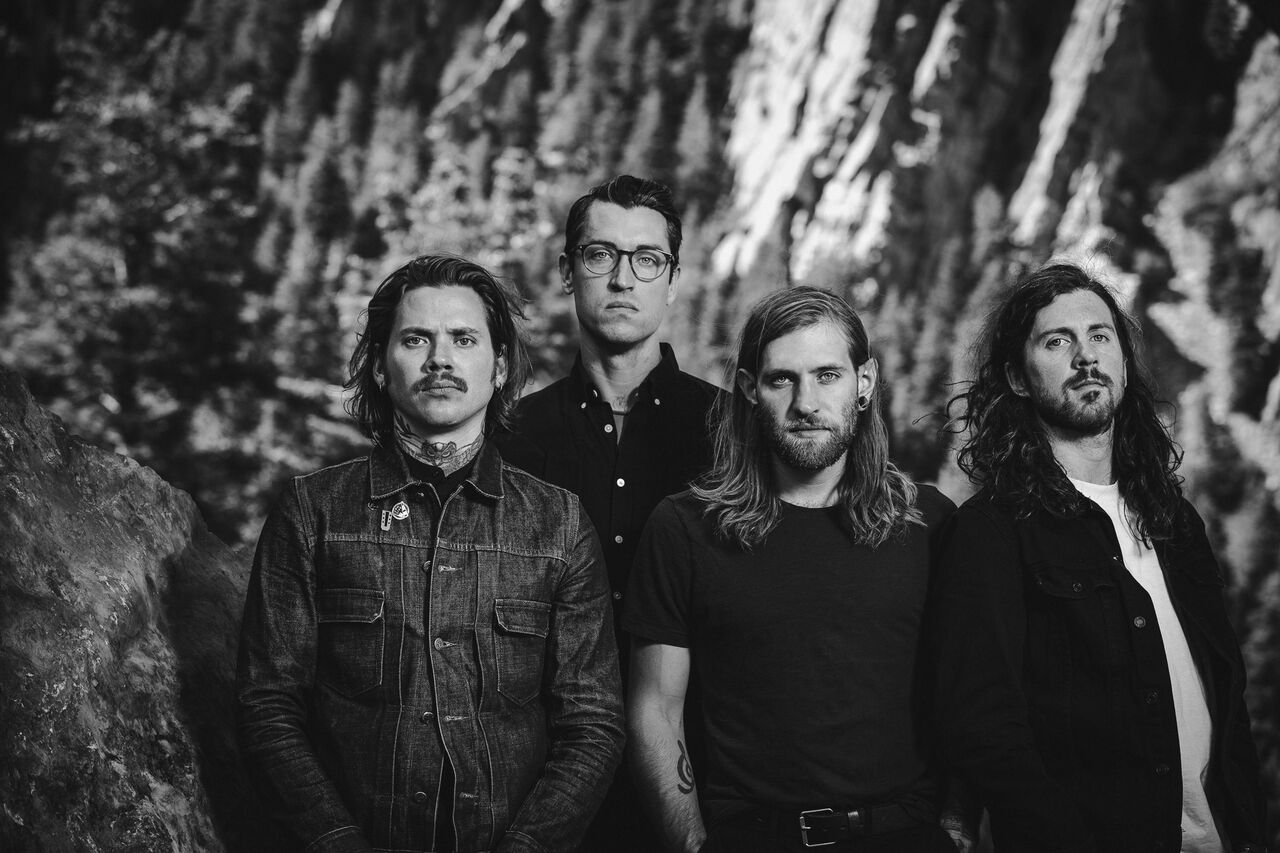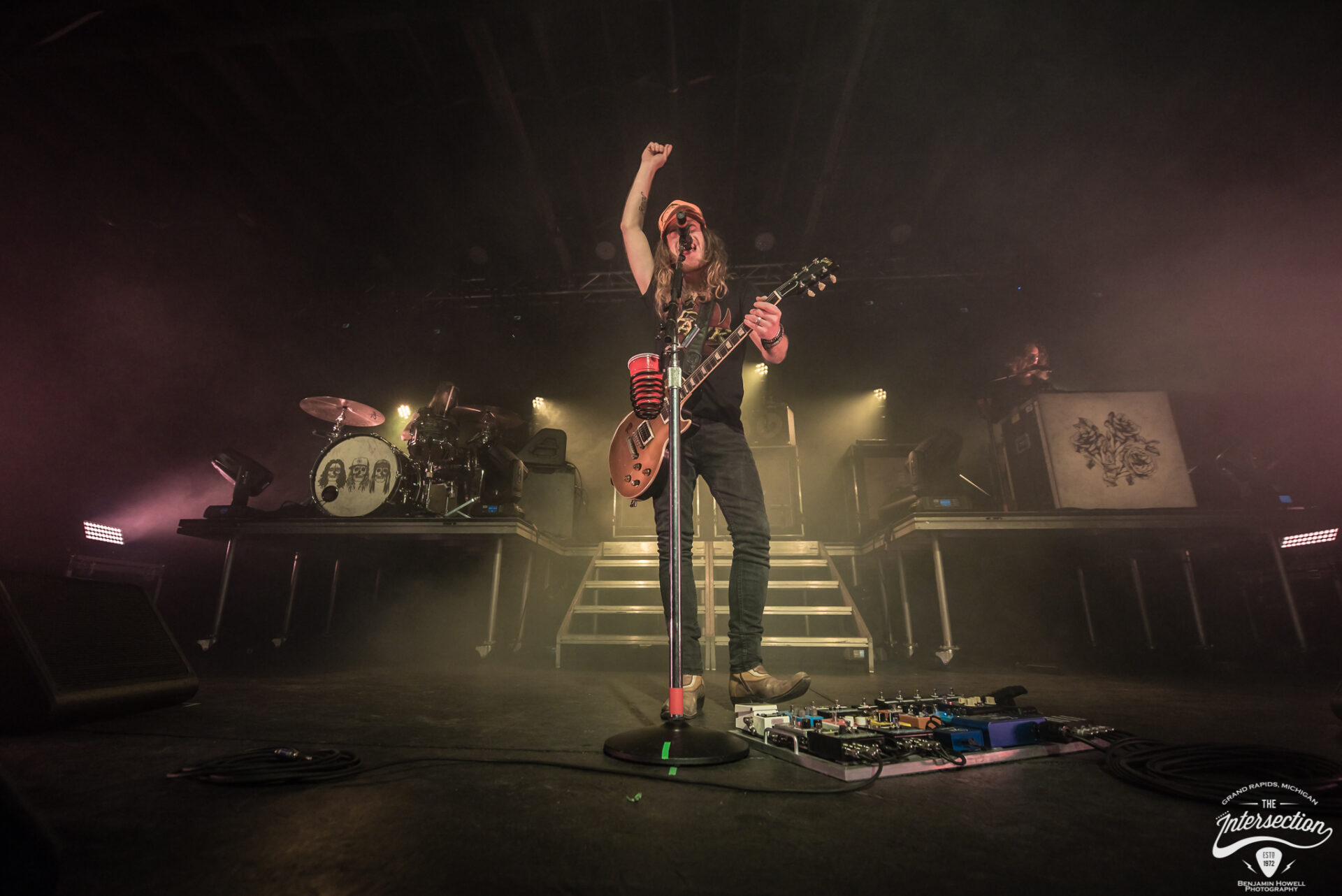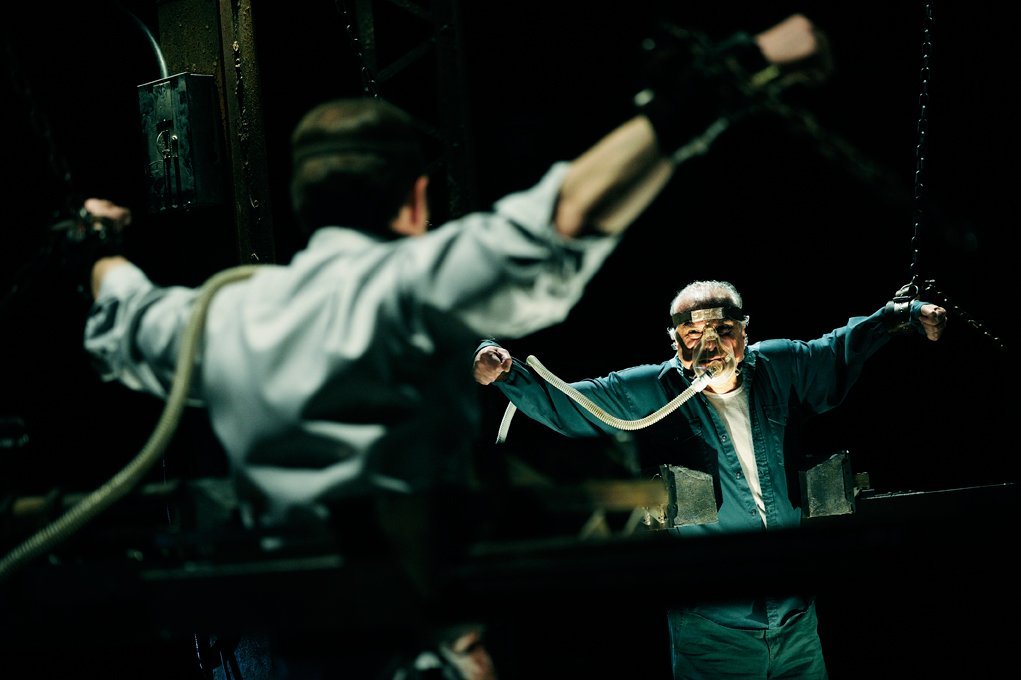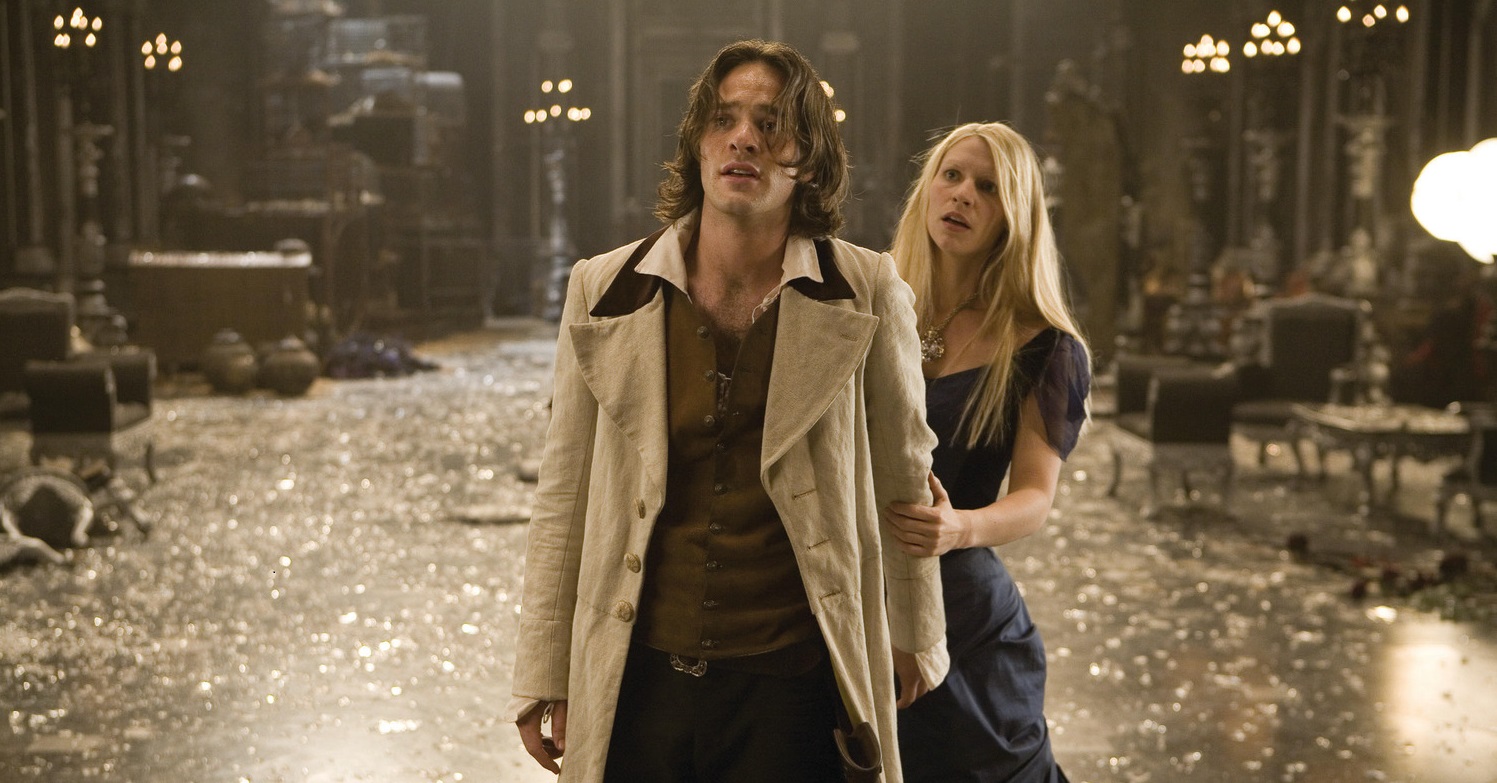Complacency can be considered death in many creative cases. Sometimes, creativity can take you to uncomfortable peaks and valley, but ultimately make you better for it. There’s a reward to keep testing your limits. The word complacency is not something that can be synonymous with The Devil Wears Prada. From their first studio album, 2006’s Dear Love: A Beautiful Discord, the band has shown growth musically throughout their works and even certain structures like 2010’s Zombie EP.
The Act, their first new album in three years and first on Solid State Records, shows their evolution in a different way than before. With keyboardist/programmer Jonathan Gering in the producer role, the band is able to express themselves in a way that harkens back to their harder rock roots, but ventures off into more atmospheric electronic soundscapes. While “The Act” itself could be anything, within the album template, there are ten tracks that embody that notion. The Devil Wears Prada refuses to be nailed down to just one type of genre.
I spoke to lead vocalist Mike Hranica about the road that lead the band to this album and how they pushed themselves creativity into making their most intriguing body of work to date.
My first question to start off, you referred to The Act as a “make or break” album for the band. From listening to your discography over the years, from With Roots to Dead Throne,and the Zombie and Space EPs, I always felt that TDWP always predicated on reinvention. Basically, you guys kind of staying ahead of the curve, and always challenging yourself. So, how did you feel going into The Act and kind of like feeling that this is a mega break for you?
I think that on our end, we’ve had a little bit of that notion of reinvention, but at the same time, not so much. With what we wanted to do with The Act was you know, if there was reinvention from record directly in the past, we wanted to do that like times 10 this time around. I think that there have been changes in the sounds when you look at With Roots to Dead Throne. I feel a lot of that is contingent on not only a lot of new tunings, but also our work and the beginning of our relationship with Adam D. I think the biggest swing into The Act was that we mix things up way more than just sonically, but also songwriting wise. Just as far as redeveloping and going about a different process on all to come up with songs differently.
I think that that a big part of turning the corner, both sonically and musically with this record. A lot of it comes down to that as far as writing and in trying to avoid the complacency of everything really that we thought set in with our songwriting. I think that 818 was a really recycled record. I think of Transit Blues in a higher sense than I think of 818. At the same time, like anything that we were going to do like Transit Blues, I think it would have been just as recycled. So is that we wanted. To start things off on a different foot and was a different vision.
Now with this album, John (Gering) and Kyle (Sipress) wrote a lot of music parts. John was the producer on it. From what I understand that, when John writes lyrics, he has more of a direct lyrical approach to where you are more abstract. How did it work with John taking over the reins of being the main producer and working with the contrast of lyrical styles? You guys almost had 60 demos for this record and scrapped most of them.
It’s good! The band has never been something where I’ve been like, “Yo, I’m doing it, I don’t want anyone else to do it.” It’s always just been a role I really take on happily and a big responsibility for me. This time around with John being so involved with the songwriting process, rather than relaying to me for every song, I’d hear something and he would just start from scratch and do the job I’ve always done.
It’s nothing like competitive for me and luckily, John is good at it. It wouldn’t be where John would make something lyrically and I would go to it and say, “from my perspective, this is subpar.” Or “I would write better lyrics than you.” It’s never like that because the dude is so talented.
It’s not competitive or territorial for me by any mean. I honestly find it a relief in that he gets to enact exactly what he hears into the songs that he makes. I really like that. At the same time, like, I lose no bit of work as far as starting from scratch with him and Kyle. As far as like, “Hey, I have this idea for a song” and then starting something sonically to reflect that. It’s all good. It doesn’t mean that my job is easier these days. At the same time, the critique is upped big time. For years, I was given a piece of music instrumentals and I would write lyrics every week. Then we would record it and ta-da, album. This time around, there’s a high level of criticism as far as John wanting to fine-tune everything to be exactly the best it can be, lyrically. So again, it’s nice having someone else chipping in lyrically, but at the same time, it doesn’t make it way easier for me either.
I wanted to touch on “Please Say No” because you are no stranger to literary references. For “To The Key of Evergreen”, you drew from Lolita. “Please Say No” draws from the novel, Never Come Morning by Nelson Algren. It’s a gritty story about a boxer in the Polish slums of Chicago. I’ve always been a fan of how you take what you’re reading and put it into song. What’s the process of quantifying what you take away from books and make it into lyrics?
It’s just so so natural and I hate to use that word. For me, when I came up with “To The Key of Evergreen,” I was sitting there was an instrumental and said, “Okay, what do I want to do with the song?” At that point, I had recently read Lolita or something. The choice was that just very immediate. It’s almost like I don’t even have to make a decision. The same thing happened when I read Never Come Morning. There’s a specific scene in the book that just rocked me so much that I instantly started jotting down ideas. It was another one where the instrumental was already there. It’s very moody and then once I put the scene over the music, we further adapted the music to the scene. When something really grabs me, it’s not like I read a book and say, “how do I make this into a song?” My brain just already has it there, if that makes sense.
It definitely does. I think when fans listen to this album, it’s kind of like how you describe The Act, right? “The Act” can be anything. When listening to this album, you guys draw from so many musical places, A song like “Chemical” that’s slower and it’s mostly Jeremy on the vocals. From there, you have songs like “Numb,” where it’s a slow burn and then it just punches you into the chorus. I find the sequencing of the album very interesting. It how it flows from the more aggressive songs into the melodic ones and then back again. You’re showing the world what you have all learned and how you’ve grown and The Act is the most mature work of TDWP to date.
Yeah, I appreciate you saying that. I mean when doing a bunch of interviews around the record as it always goes, people ask about how things change. I think that’s one thing that oftentimes gets overlooked is that we play music as a passion. For me, as a guitar player, I don’t contribute much on guitar for the band. I’m always really excited when I can. For me, if I never played another show or never made another record, I would still be playing guitar in my basement. I would still be trying to be better at my craft. Whether it’s a hobby or a job.
I know that the other guys, especially Kyle who is such a driven guitar player, you get better with time. It’s like with athletics which I always like to parallel. As you get older and if you want to play guitar, drums, or whatever it is. If you work hard on it when you’re home as we do, you’re going to get better at it. I think that we becoming better guitarists or keyboard players or whatever comes through on the record. Ultimately, that’s the goal.
So with that, in reference to your question, if it wasn’t a more mature effort or a better record than like, it’s a waste of time. It’s a waste of energy or mental space. I think it’s flexing that muscle as far as trying to make a better record. That’s what we wanted to do, as not just being a better record, but a very different record. I kind of think of that with Transit Blues. I think that’s a better record than 818, but at the same time, it’s because it’s not entirely reinvented, I don’t think it’s scratched enough of an inch.
As far as like sequencing and tracklisting, we as music listeners are always driven to make something atmospheric with a record. Just to be really event advantageous with the tracklisting. We’re not just a band that is creating these 30-minute, hard-hitting front to back efforts. We want those low points and we want those heavy, big points. Actually, the tracklisting was pretty easy this time around. John and I knocked it out. It wasn’t an argumentative process or anything where it was like his vision versus mine. It’s just creating those peaks and valleys for a record. Whenever anyone mentions tracklisting, I always mentioned Jimmy Eat World as a fan. I’ve always thought they’ve done such a terrific job creating those highs and lows through 40 minutes. That is something that is so damn important in making a record. I think it definitely has a huge part in The Act which I’m a big fan of on this album, as well.
The Act starts off with “Switchblade.” It starts off one way, breaks off to this electronic part, and goes into a whole different song. The track itself is less than three minutes, but it sounds like two different tracks. With “Isn’t It Strange,” there’s the piano and everything feels like it’s behind a wall distortion. There are more experimental. How did you guys go about mixing the more electronic parts of the record with the more rock-driven ones?
I think that what I was saying, as far as trying to become a better musician, I think that really exemplified what John did with the programming and the electronics of the record. A lot of that songwriting, I wasn’t even in the room of it. it was Kyle and John sending demos back and forth. When I first heard the instrumental for “Please Say No,” it was going off this little loop pattern thing. That’s something I don’t think we would have ever done even six years ago. It’s something that all of our favorite bands do all the time in using these weird sounding loops. Or even making loops that out of things that aren’t exactly musical.
John did a really great job injecting that into certain parts of the record and using programming in a different way. Even using it in like a really uncomfortable way like with the end of “Switchblade” or “Isn’t It Strange,” where there’s a lot of tension in certain moments. I was talking to a friend about this. He started his band and it was a metalcore band with keyboards. You just have breakdowns and these big chords over these progressions. You start there and then fast forward 14 years, and you’re using it and that tool entirely differently. And in my opinion, certainly, for the better.
Yes, because in “Spiderhead,” the song has a breakdown, but it’s not a typical one that you would hear. You hold notes at the end longer and then play on them. It’s I describe it as a James Wan horror movie where you’re expecting a scare and he holds it for an extra beat before it hits you. I really dig how you guys played around with your old-style and tweaked it.
We’re to the point and we’ve done so many times that anything that’s just like a chug rhythm isn’t going to make the cut. It’s not going to be interesting enough for feel like a moment that hasn’t been created. Or creating an itch to scratch for these emotional moments and songs. Just not wanting to do it again. Not wanting just like another beat down part. It might trigger the same sort of aggression and such. Writing breakdowns. those moments of songs are certainly different now than it was on making earlier albums.
I noticed that there’s a connective tissue between two different songs on the record. “Kids” is reflecting on the simpler times of youth. Then there’s “The Thread.” You speaking to corrosion on metal. It’s a metaphor for life and as you get older, things like grief and sadness stick on you. Corrode you a little bit. In your viewpoint, like, how do you balance the two?
You know, suffering is found its way into my work more often than not in the last number of records. I think that looking at it, by means of degradation is very applicable to The Act and the sort of perspective that the songs take. “The Thread” is one of the heavier songs, it’s not the heaviest. As far as the end and everything. When I heard that instrumental and we started working on that song, I felt like so many industrial moments. There’s this, sort of like Slipknot-tapping rhythm to the beginning. I immediately was compelled to create a story about rust.
I’m created all these industrial references throughout the song and using the thread as being this very fragile, vulnerable thing representing life. While these very heavy, massive 10,000 tons somehow gaining mounts. Using that scope versus a lone thread representing life. Yeah. With “Kids,” it’s a getting older type of song. Even using the word kids is always for me, just immediately that kind of like pop punk thing, which I personally don’t favor or listen to personally. However, I wanted to kind of have that viewpoint or make a song with the notion of exploring childhood and what one considers at that age versus my age now. I wanted to try and do so without the really threadbare repetitive cliches that we hear when songs take about childhood or high school.













